Ise Jingu Grand Shrine, Naiku on New Year's Day 伊勢神宮 内宮(皇大神宮)
|
|
|
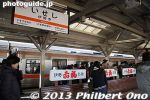
Ise-shi Station platform upon arrival on Jan. 1, 2013. Ise Jingu's Geku Outer Shrine is a short walk from this station.
|
|
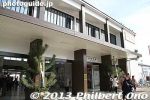
Ise-shi Station with kadomatsu New Year's decorations.
|
|
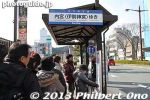
Bus stop for Naiku Inner Shrine. This is near Ise-shi Station.
|
|

Inside the bus going to Naiku from Ise-shi Station.
|
|
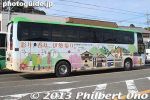
Colorful bus at Ise.
|
|
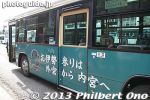
Bus with motif promoting Ise. Going to worship at Ise Jingu is called "Ise-mairi."
|
|
|

Map of Ise Jingu's Naiku Shrine. First you cross Uji Bridge.
|
|
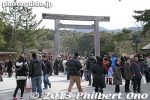
Torii gate at Uji Bridge. Very crowded with New Year's worshippers going for hatsumode prayers.
|
|
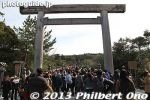
Ise Jingu Shrine's Naiku (Inner Shrine) is the main and most popular shrine at Ise. The shrine is rebuilt every 20 years and 2013 will mark the completion of the new shrine to replace the old one built in 1993.
|
|

Ise Jingu Shrine's Naiku is officially named, "Kotaijingu" (皇大神宮). It worships Amaterasu Omikami 天照坐皇大御神, the ancestor of the Imperial Family and the tutelary kami of the Japanese people. Naiku was founded 2000 years a
|
|

Crossing Uji Bridge, a little over 100 meters long. 宇治橋
|
|

A guard watching over the crowd crossing Uji Bridge.
|
|
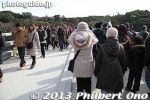
Uji Bridge is also rebuilt every 20 years.
|
|
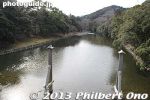
Uji Bridge goes over Isuzu River. 五十鈴川
|
|
|

The other end of Uji Bridge also has a torii gate.
|
|
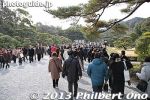
After crossing Uji Bridge, it is a gravel path to the shrine.
|
|
|
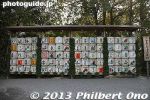
Barrels of sake as offerings.
|
|
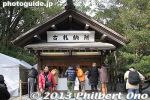
Place to dispose of old decorations bought from the shrine.
|
|
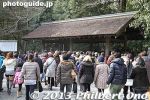
Water fountain where you wash your hands and rinse your mouth for purification. 手水舎
|
|
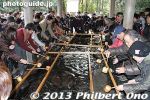
Before praying at the shrine, you're supposed to purify yourself. Wash your hands and rinse your mouth here. Use the ladle to pour water into your hand, then sip the water from your hand. Don't sip the water directly from the ladle. 手水舎
|
|
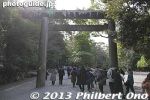
The first torii or Daiichi torii.
|
|
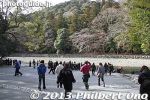
Another place to purify yourself on the banks of Isuzu River at this place called the Mitarashi. 五十鈴川と御手洗場
|
|

Dip your hands here in Isuzu River. Auto maker Isuzu was named after this crystal-clear river. 五十鈴川と御手洗場
|
|
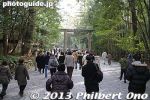
We could easily proceed from Uji Bridge to this Daini (Second) torii. So far so good.
|
|
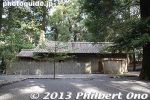
Horse stable.
|
|
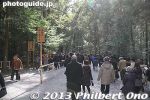
Still walking at a good pace.
|
|
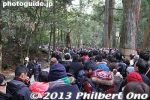
About 300-400 meters to the Naiku shrine, it got congested. It took about an hour to reach the foot of the steps going up to the shrine.
|
|
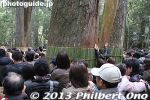
Bamboo strips protect the trees.
|
|
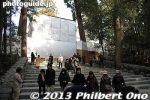
This is the steps leading to the new Naiku shrine that will be completed this fall 2013. The shrine buildings are already close to completion, but they are covered up.
|
|
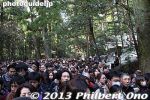
Lot of people here, but it's still not as crowded as Meiji Shrine in Tokyo.
|
|
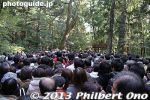
I could see the heatwaves from the people's bodies. Still inching forward.
|
|
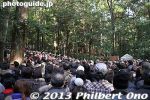
Getting closer to the bottom of the steps leading up to the Naiku shrine.
|
|
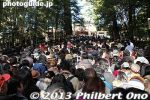
Naiku shrine and torii are in sight at the top of the steps ahead. We were told that it would take more than an hour just to get up these steps. However, we could walk up the steps quickly on the right edge of the steps.
|
|
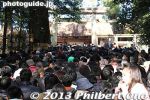
On the steps going up to Naiku shrine. This was where it got ridiculous. Literally a snail's pace.
|
|
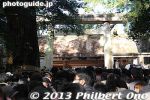
Naiku torii at the top of the steps.
|
|
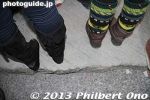
At the bottom of the steps going up to the shrine.
|
|

Close up map of Naiku. An adjacent plot next the shrine is for the next rebuilding of the shrine. The current, 20-year-old Naiku shrine is on an adjacent plot of land. It takes 8 years to rebuild the Naiku shrine. So 12 years from now, they will start the rebuilding process all over again. Numerous ceremonies are held for this rebuilding, but only a few of them can be seen by the public.
|
|
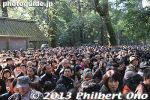
People behind me.
|
|
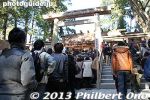
The bottleneck at Naiku was this little torii which most people wanted to walk through at the top of the steps. People like me who didn't have time opted to go up the steps on the right side in no time.
|
|
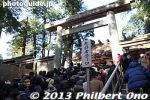
We didn't get to go through the torii, but it wasn't worth the wait. They never explained the difference between staying in the middle of the steps and going up on the right edge.
|
|
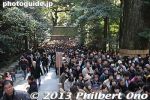
The scene from the top of the steps. People on the right are aiming for the torii. People on the left are shooting up the steps in no time.
|
|
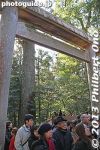
Naiku's bottleneck. These people took at least an hour to climb up the steps to go through this little torii. So it must've taken them at least 2 hours to get here from Uji Bridge. Normally it's a 10-15 min. walk.
|
|

The people who went up the right edge of the steps didn't go through the torii and could only pray at a temporary, off-center position under the slim roof seen here on the right of the thatched-roof gate.
|
|
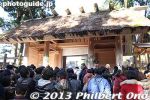
After going through the torii, they could pray at this center position under this thatched-roof gate in front of the shrine.
|
|
|
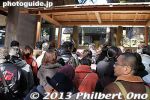
There was a money box under both the thatched roof and under the slim roof structure next to it. Either way, you can still pray at the shrine. Not a big deal if you don't go through the torii or don't pray from the center spot under the thatchedIt really looked like the people going up on the right edge were exiting without praying at the shrine. Not so. They could also pray at the shrine, but at an off-center position.
|
|
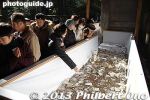
Look how small the offertory box is at Ise Jingu's Naiku. The one at Meiji Shrine in Tokyo is like half the size of a football field. Of course, Ise Jingu just doesn't have the space for it.
|
|
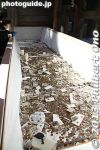
Small offertory box.
|
|

My video of Ise Jingu Naiku on Jan. 1, 2013.
|
|
|
|
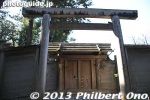
Side torii gate at Naiku.
|
|
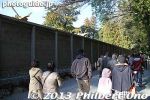
High walls prevent us from seeing the sacred shrine buildings of Naiku. Photography is not allowed inside these walls so don't try to use a long pole with a camera attached to take pictures. There are guards everywhere.
|
|
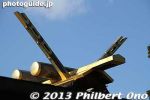
Roof horns at Ise Jingu's Naiku.
|
|
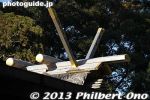
This is all we can see of the main shrine building called the Shoden (正殿), the home of Amaterasu. The design of the shrine buildings are especially beautiful and awe-inspiring. Too bad we can't see it. There are photographs (especially by Yoshio
|
|
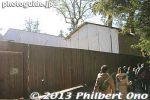
It takes 8 years to rebuild the Naiku shrine. So 12 years from now, they will start the rebuilding process all over again. Numerous ceremonies are held for this rebuilding, but only a few of them can be seen by the public.
|
|
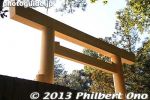
Brand new wooden torii.
|
|
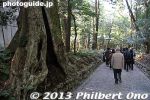
Way back.
|
|
|
|
|
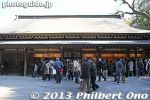
Shrine gift shop for amulets etc. Make no doubt, religion in Japan is very big business. They are in the business of selling hopes, dreams, prayers, ceremonies, and amulets.
|
|
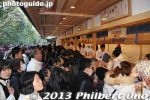
The great thing for them is that they need not provide any guarantee that your hopes, dreams, and prayers will come true for you. No such thing as a product warranty nor money-back guarantee.
|
|
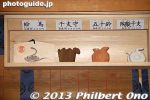
Snake souvenirs for sale. Major Shinto shrines make much of their income during New Year's.
|
|
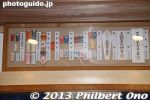
Imagine providing a service or product for which you need not worry about complaints, defects, malfunctions, errors, or failures. And the customer base is guaranteed forever.
|
|
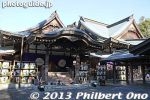
Kaguraden hall for sacred dances and prayers. 内宮神楽殿
|
|
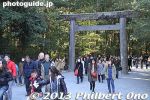
People still streaming toward Naiku shrine passing through the second torii.
|
|
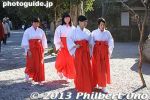
Ise Jingu shrine maidens look the same as any other shrine maidens. They are likely college students hired just for New Year's to sell goods.
|
|
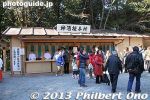
A sip of sake at this booth. I saw no indications of a fee for this sake, but there was a donation tray right there.
|
|
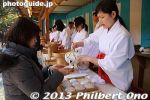
I wondered how much I should donate for this sake. I just dropped a 100 yen coin and probably got 20 yen worth of sake. At Atsuta Shrine (one of Japan's Big Three shrines) in Nagoya, they have a nice big hall where they serve hot tea and sweets for Nothing like that here.
|
|
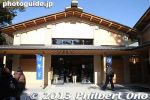
Sanshuden rest house
|
|
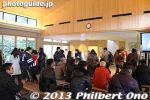
Inside Sanshuden rest house, a nice warm place to rest.
|
|
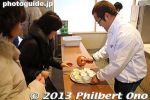
They served free green tea.
|
|
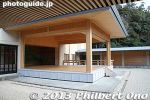
THe rest house had a view of a Noh stage.
|
|
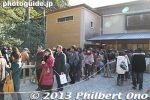
Much more popular than sake was amazake (sweet sake). This line was too long for me so I skipped it.
|
|
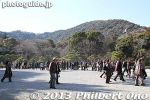
Where the people coming and going converge at Ise Jingu's Naiku.
|
|
|
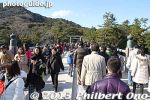
Uji Bridge on the way back.
|
|

Isuzu River as seen from Uji Bridge. Water from this river is used in the shrine's ceremonies and rituals.
|
|
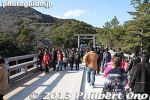
Crossing Uji Bridge on the way back.
|
|
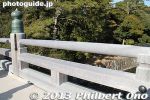
Uji Bridge showing its 20-year age.
|
|
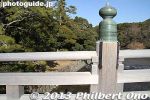
Uji Bridge is made of hinoki cypress wood. The bridge columns are made of keyaki.
|
|

Map of Naiku at Ise Jingu Shrine and adjacent area.
|
|
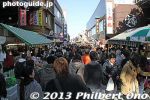
Right outside the entrance Naiku is a long shopping street called Oharai-machi, mainly food stalls. it leads to a parking lot. Very crowded on New Year's Day.
|
|

Dried fish.
|
|
|
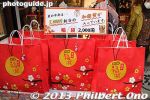
Lucky bags.
|
|
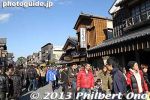
Oharai-machi shopping street outside Naiku entrance. Bus stop for the train stations and Geku is near here.
|
|
|
|
|
|
|